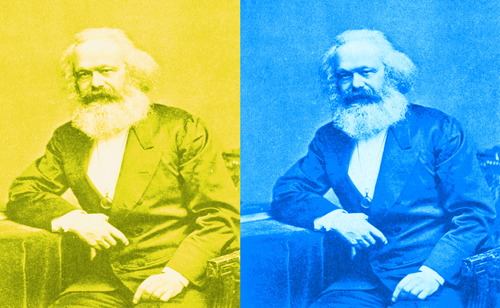
Your complimentary articles
You’ve read one of your four complimentary articles for this month.
You can read four articles free per month. To have complete access to the thousands of philosophy articles on this site, please
Philosophical Haiku
Karl Marx (1818-1883)
by Terence Green
A haunting spectre
Class conflict drives history
The fated end comes.

Karl Marx argued that history was determined by forces much greater than any one person, and so he would be dismayed if I suggested he was pivotal in shaping our world. Still, he’s not here to object – so let me suggest that he was pivotal in shaping our world! No philosopher, I would suggest, has had a greater impact on our time. Some read his words and find in them their holy scripture; others read them and saw the work of the Devil. Either way, we can’t understand the twentieth century (and the end of the nineteenth) without understanding Marx. Even when his ideas were distorted beyond belief, still, the idea of Marx or Marxism was invoked.
His basic thesis goes like this. The way we make the things we need to live – how our economy functions – determines the other characteristics of our society: its laws, religion, habits, customs, and everything else that makes any particular society what it is. For Marx, the two key parts to the economy are the means of production – how we make things – and the relations of production – the relationships between who controls the means of production, and who does all the work. Over time, as the means of production change, tensions arise in the relations of production until some sort of catastrophe occurs, leading the labouring class to overthrow the ruling class, and we find ourselves in a new epoch, with a new controlling class… This is how history moves along for Marx – right up until the workers control the means of production, which is communism.
It’s an absolutely ingenious idea. The less ingenious part was to say that communism is inevitable. Rather than saying that it’s a nice idea and we should give it a go, Marx argued that the (his) scientific analysis of history proved that communism was the last stage of human economic development.
With one eye on the economics of the past, and one eye on the economics of the future, Marx had no eyes left for the economics of the present: he lived most of his life as the very model of the destitute proletarian, surviving on handouts from his factory-owning friend Friedrich Engels.
© Terence Green 2020
Terence Green is a writer, historian and lecturer who lives in Paekakariki, New Zealand.









